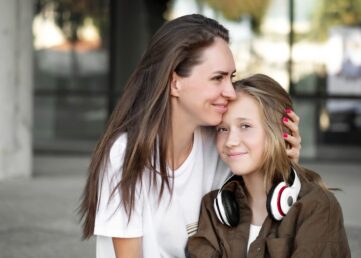Recognising Depression in Teens: What Parents Need To Know

Depression is a mental health condition that can affect anyone, regardless of age. While it is often associated with adults, it is essential to recognise that teens can also experience depression.
Adolescent depression has been estimated to be 1% in pre-pubertal children and around 3% in post-pubertal young people, and approximately 7.6% of children aged 12 years and older have had moderate to severe depression [Haefner, 2016]. The increase in childhood depression, although concerning, presents an opportunity to provide support to children and young people during their all-important former years.
So, how can parents and caregivers help? Firstly, parents and caregivers can make themselves aware of the signs and symptoms of depression in teenagers. Secondly, striving to support the young person is vital, whether talking it out or accessing professional help. Onebright explores the signs of depression in teens and discusses how online CBT therapy can be a valuable resource in helping them.
Looking beyond the surface
Depression in teens can present itself differently compared to adults. Children and young people may not have the vocabulary or understanding to express their emotions clearly, making it challenging for parents to identify their struggles. However, there are some common signs to look out for.
Symptoms of depression in children
One of the key symptoms of depression in children and young people is a display of persistent feelings of low mood or unhappiness. If your teen is consistently sad, withdrawn, or disinterested in activities they once enjoyed, it may be a cause for concern. They may exhibit ideas of guilt and unworthiness with a bleak and pessimistic view of the future. This may be accompanied by suicidal thoughts and self-harm.
The clinical characteristics of depression vary according to age at presentation:
- Children have a higher rate of physical complaints than adolescents, including headaches and abdominal pains, and tend not to look depressed.
- Adolescents are more likely than children to complain of subjective feelings of low mood and to have a higher rate of suicidal thoughts and self-blame.
- Adolescents tend to have more mood swings because of hormonal changes associated with this developmental stage of life. It is important to distinguish between normal highs and lows of mood and behaviours and moods and behaviours that are representative of depression.
More symptoms may include:
Young people with depression may exhibit irritability and difficulty controlling their emotions. They may become easily frustrated or angry, even over minor issues.
Changes in appetite can also be indicative of depression in children. Some may start to overeat, while others may lose their appetite. These changes in eating patterns can be a response to emotional distress. If parents and carers notice these changes, it’s important to acknowledge them and put a support plan in place.
Disturbed sleep is one of the most common symptoms of Major Depressive Disorder (MDD) in adolescence.
Another red flag to look out for is a decline in academic performance. Teens with depression may struggle to concentrate, leading to a decline in their schoolwork. They may also seem lacking in self-esteem or have intense worries and fears that prevent them from doing things they may have enjoyed.
Depression can also impact social interactions. They may start withdrawing from friends and family, preferring to spend more time alone. They may also experience conflicts with their peers, engaging in fights or hurting others’ feelings. It is essential to address these behavioural changes promptly and offer support.
What does an effective support plan look like?
Recognising the signs of depression in young people is the first step towards helping them. Online Cognitive Behavioral Therapy (CBT) can be a valuable resource in providing support and treatment. CBT focuses on identifying negative thought patterns and replacing them with healthier, more positive ones. It equips children with coping mechanisms and strategies to manage their emotions in a healthy way.
Onebright offers CBT therapy online, allowing children to access the support they need from the comfort of their own homes. Their qualified therapists specialise in working with children and young people providing a safe and compassionate environment to support their recovery. With the convenience and accessibility of online therapy, parents can play an active role in their child’s mental health recovery journey.
Onebright for Children’s Mental Health Support
Onebright can support your child’s recovery and return to their full functioning with fast access to therapy. Children and young people who receive effective evidence-based care at the right time to tackle the problem head-on before it gets worse are more likely recover and return to full functioning (Early Intervention Foundation, 2023).
It is important to remember that depression in children is a treatable condition. Children can overcome their struggles and lead fulfilling lives with early intervention and the proper support. If you suspect that your child may be experiencing depression, reach out for help.



